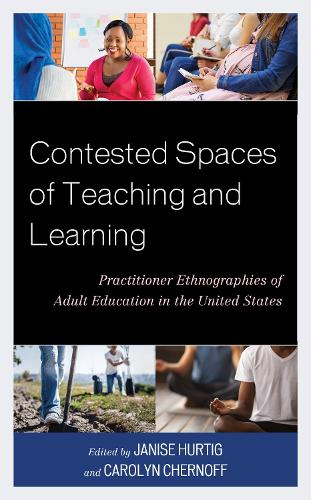
Contested Spaces of Teaching and Learning: Practitioner Ethnographies of Adult Education in the United States
(Hardback)
Publishing Details
Contested Spaces of Teaching and Learning: Practitioner Ethnographies of Adult Education in the United States
By (Author) Janise Hurtig
Edited by Carolyn Chernoff
Contributions by Carolyn Chernoff
Contributions by Janise Hurtig
Contributions by Jill Koyama
Contributions by Silvia Noguern-Liu
Contributions by Carolina Osorio Gil
Contributions by Tryphenia B. Peele-Eady
Contributions by Sara K. Schneider
Contributions by Katherine Silvester
Bloomsbury Publishing PLC
Lexington Books
8th November 2019
United States
Classifications
Professional and Scholarly
Non Fiction
Social and cultural anthropology
374.973
Physical Properties
Hardback
244
Width 158mm, Height 232mm, Spine 24mm
549g
Description
Contested Spaces is an edited collection of critical ethnographies that examine the educational experiences of adults as cultural practice. These practices take place in diverse settings -- from the formal and subtly negotiated educational contexts of school classrooms, parent or adult education programs; to the institutionally interstitial realms of a worker training program, Bible study class, prison yoga class, or refugee resettlement program; to fluid and explicitly contested everyday spaces: an LGBTQ choir, a public parade, or Latinx cultural programming.The compilation includes twelve richly rendered case studies written from the perspective of practitioner-ethnographers -- individuals who straddle the roles of educator and ethnographic researcher. A central premise of the book is that, even as the terrain of adult education is increasingly infused with the aims and ideologies of neoliberal capital, participants in specific educational programs and activities are continuously forging educational alternatives to neoliberal education. Each chapter examines educative practices that either directly contest conventions of adult teaching and learning, and/or subtly challenge conventional ways of understanding the practices of adult teaching and learning. Drawing on distinct theoretical framings, each author illuminates the ways in which adults engaged in teaching and learning participate in cultural practices that necessarily intersect with other dimensions of social life, such as work, recreation, community engagement, personal development, or political action. By juxtaposing ethnographic inquiries of formal and informal learning spaces, as well as intentional and unintended challenges to mainstream adult teaching and learning, Contested Spaces provides new understandings and critical insights into the complexities of adults educative experiences.
Reviews
The editors and authors of this essential volume deliver an ethnographic tour de force. Somehow, both gently and forcefully, using language of vernacular and theory, they contest our facile dichotomies of teaching and learning, practitioner and academic, school and out-of-school, adult and child.This remarkably diverse set of case studies introduces a panoply of enriching practices and understandings of adult education in the United States. It also enables readers to see afresh the dynamic cultural production that meaningful teaching and learning always entails. -- Bradley A. Levinson, Indiana University
In this groundbreaking book, we see the start of a much needed conversation on the often neglected, yet critically important, ways that adults fight against the commodification of their experience. Eschewing a focus only on formal settings, the contributors explore multiple activist spaces in which adults are trying to exercise their collective power. This is a must-read for anyone interested in critical resistance and adult educational processes that animate people's agency. -- Stephen D. Brookfield, University of St. Thomas
Through luminous, critical ethnographic vignettes, the contributors to this edited collection deftly explode dominant, pragmatist notions of adult education and demonstrate how educative practices and policies in the United States are riven with cultural politics. -- Lesley Bartlett, University of Wisconsin-Madison
This collection of critical ethnographies of adult teaching and learning is an exhilarating journey across educative spaces that contests conventional practices and definitions of teaching and learning. Through the examination of diverse settings in adult education, this anthology insists on the conceptualization of community spaces as locations where new social identities and learning communities are co-constructed within meaningful and enduring relationships. -- Norma Gonzalez, University of Arizona
Author Bio
Carolyn Chernoff is faculty member at Moore College of Art & Design. Janise Hurtig is faculty member at DePaul University.
